
"Turn Up the Beat" is the debut single by Australian pop singer Tina Arena, released under the name of Tina.
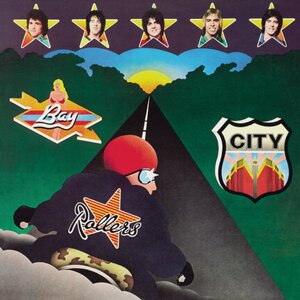
Once Upon a Star is the second studio album by the Bay City Rollers. Released in May 1975, the album features the UK number-one hit single, "Bye Bye Baby".

The Sweet Singles Album is a 1975 compilation album by Sweet released on RCA Records for the Australia and New Zealand market only. It was released by RCA Australia, mainly to capitalise on The Sweet's various heavier singles from the 1973-74 period, ahead of the band visiting the region and touring. The Sweet Singles Album does not replace any of the original European Sweet release albums but complements them. The track listing shows a harder rock style and a move away from the softer bubblegum tracks of the earlier 1968-72 period.

On the Level is the eighth studio album of English rock band Status Quo. It features Francis Rossi, Richard Parfitt, Alan Lancaster and John Coghlan. The album's cover art features band members in an Ames room, and on the original vinyl release, the inner gatefold sleeve consisted of informal photos members of the group had taken of each other.
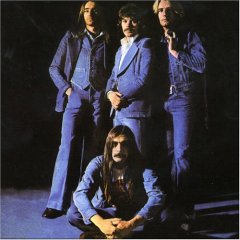
Blue for You is the ninth studio album by English rock band Status Quo. It was released in March 1976, and is the last album until 1980's Just Supposin' that they produced themselves, which resulted in subsequent albums having a noticeably lighter, more pop oriented sound.

Footsteps in the Dark: Greatest Hits Vol. 2 is a compilation album released by Cat Stevens in 1982. Its fourteen songs include hits such as "Father and Son" and "Where Do the Children Play?" as well as two previously unreleased tracks from the Hal Ashby and Colin Higgins black comedy Harold and Maude (1971). And the obscure B-side "I want to Live in a Wigwam" from the Teaser sessions.

The Very Best of Leo Sayer was a greatest hits compilation album released in May 1979. His seventh album, it was in the #1 spot in the UK Albums Chart for 3 weeks, and in Australia for 1 week. It is his only chart-topper in the UK Albums Chart. It was never released in the United States.
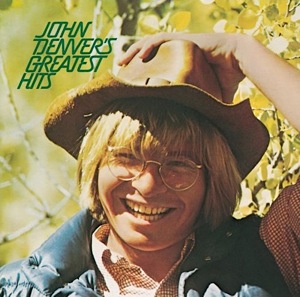
John Denver's Greatest Hits is American singer-songwriter John Denver's first compilation album, released in late 1973 for the holiday shopping season. A version known as The Best of John Denver with the same track listing was released in some countries.

"Farewell Aunty Jack" was the closing theme to The Aunty Jack Show, played at the end of each episode. It was re-recorded and released as a hit single in late 1973 and spent 3 weeks at number one in the charts in Australia in February and March 1974.
Parabrahm is the second studio album by Australian singer-songwriter Brian Cadd. It followed the success of his debut self-titled album. It was released in Australia in October 1973 by Bootleg Records and in the United States on Chelsea Records.

Two of a Kind: Music from the Original Motion Picture Soundtrack is the soundtrack album of the film of the same name released in 1983 by MCA Records and features songs by the film's star Olivia Newton-John, as well as songs from various other artists.
The discography of Brian Cadd, an Australian singer-songwriter, who had four Australian Top 20 singles and three Top 20 albums in the early 1970s. Cadd was also the lead singer of bands such as The Groop, Axiom, The Flying Burrito Brothers and The Blazing Salads. On 18 July 2007, the Australian Recording Industry Association (ARIA) recognised Cadd's iconic status when he was inducted into the ARIA Hall of Fame.
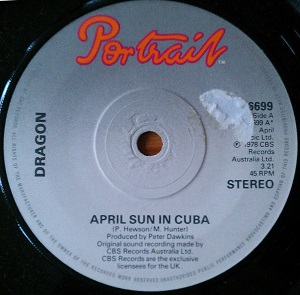
"April Sun in Cuba" is a song recorded by New Zealand group Dragon, released in October 1977. It is the first single to be released from Dragon's fourth studio album Running Free. "April Sun in Cuba" first charted on 7 November 1977, peaking at number 2 on the Kent Music Report Singles Chart and staying on the chart for 22 weeks. It also reached number 9 on the New Zealand singles chart.

Moonshine is the third studio album by Australian singer-songwriter Brian Cadd. It was released in Australia in August 1974 by Bootleg Records and internationally on Chelsea Records.

The Magic of Brian Cadd is the first greatest hits album by Australian singer-songwriter Brian Cadd. It was released in Australia in April 1975 by Bootleg Records. The album includes tracks from his three studio albums to date; Brian Cadd, Parabrahm and Moonshine as well as his debut single "Show Me the Way" on an album for the first time. The album was the Cadd's final release on this label.

White on White is the fourth studio album by Australian pop/rock singer-songwriter, Brian Cadd. It was released in 1976 via Capitol Records with Robert Appère producing. White on White peaked at number 93 in the Australian Kent Music Report album charts.

Keep On Rockin' is the second greatest hits album by Australian singer-songwriter Brian Cadd. It was released in Australia in 1976 by J&B records. The album peaked at number 54 in the Australian Kent Music Report album charts in 1984.

"A Beat for You" is a song by Australian pop group Pseudo Echo. The song was released in April 1984 as the second single from their debut studio album, Autumnal Park (1984). The song peaked at number 12 on the Australian Kent Music Report.
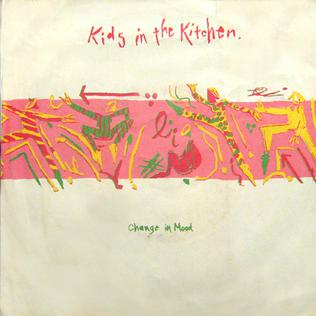
"Change in Mood" is the debut single from Australian pop/new wave group Kids in the Kitchen. The song was released in October 1983 as the lead single from their debut studio album, Shine (1985). The song peaked at number 10 on the Australian Kent Music Report.
"He's My Number One" is a pop song written by Terry Britten and B. A. Robertson and recorded by Australian pop singer Christie Allen. The song was released in January 1980 as the fourth single from Allen's debut studio album, Magic Rhythm (1979). The song peaked at number 4 on the Kent Music Report in Australia.


















